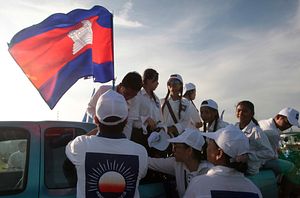It is not quite time for the aging leaders of Cambodia’s opposition to shuffle off the stage, as proposed by David Hutt in his article “Cambodia’s Opposition Needs to Take a Sabbatical” in The Diplomat on February 27. The choice of the word “sabbatical” is odd. A sabbatical is usually a period of paid leave from an academic position. Kem Sokha was the leader of the Cambodia National Rescue Party (CNRP) when it was dissolved in 2017. He is now aged 70 and presumably, according to the article’s logic, is too old to hold such a position
Kem Sokha is now serving 27 years in detention at his home under his bogus treason conviction. He is not allowed to see anyone, including his medical doctors and his lawyers, without court approval. It’s fair to assume that he won’t be going on sabbatical any time soon. Son Chhay, a vice president of the Candlelight Party, may not be able to afford a sabbatical, as he has been ordered by the courts to pay $1 million in damages simply for having criticized the conduct of Cambodia’s local elections in June 2022.
Thach Setha, another party vice president, no doubt would appreciate a sabbatical, especially as he has suffered from diabetes and heart problems. But he has been in detention since his arrest in January 2023.
The ossification of the normal processes of political renewal is one of the results of the decision by former prime minister Hun Sen to ban the opposition, whether in the shape of CNRP or the Candlelight Party, from contesting the national elections of 2018 and 2023. The CNRP’s headquarters was seized by the government, with co-founder Sam Rainsy and myself being forced into exile.
The party’s supporters continue to face arbitrary arrest and extrajudicial violence, even if they have succeeded in fleeing to neighboring Thailand. Cambodia, according to Human Rights Watch figures, has over 60 political prisoners, not a single one of whom has been released by Hun Manet since he became prime minister last August. Are exiled leaders of the democratic movement to tell them that they are now on sabbatical?
Where in the world does there exist a political party that would be able to recruit and develop its next generation of leaders in such circumstances? And why would the Hun family regime allow the CNRP or Candlelight to re-emerge under younger leadership? The regime has spent the last decade trying to stamp out any trace of opposition. Why would it then simply open the door to the new generation of younger opponents which most certainly exists in Cambodia?
The Supreme Court’s decision to dissolve the CNRP in 2017 entailed the loss of its 55 national assembly seats and over 5,000 commune councilor seats. Not a single one of these democratically elected representatives was defeated at the ballot box. Their mandates were simply canceled by dictatorial edict.
Where in the world are there democratically elected politicians who would accept exile in silence after such an action? Why should forced exile be accompanied by self-imposed political silence? It would be an unconscionable choice for any democratically elected politician. Anyone who accepted such a choice probably would not, and certainly should not, have gone into politics in the first place.
These, of course, are no more than rhetorical questions. The existence of a 3 million-strong global Cambodian diaspora means there are still opportunities, indeed responsibilities, for meaningful political action. The diaspora, spread across Asia, North America and Europe, is a legacy of civil war and the Khmer Rouge genocide of the 1970s.
Provided it does not allow itself to be cowed into silence by transnational repression, the diaspora can ensure that the Cambodian government will never be allowed to present a false image of itself to the world. Policies adopted by the government will continue to be subject to opposition critique. The diaspora can educate international policymakers and highlight issues such as deforestation and cyber-slavery in Cambodia, which would otherwise risk falling off the agenda.
Those are the reasons why I decided to leave my former position as vice president of the CNRP and become president of the Khmer Movement for Democracy (KMD), a diaspora-based movement for democracy in Cambodia, which is being officially launched in March.
The KMD is designed to give the diaspora a voice. It can keep the world informed about Cambodia by providing information that the state-controlled press will never publish. It can help to educate mainstream political parties in democratic countries on how the rights that many take for granted must be defended at every turn.
It is open to all Khmer regardless of their political persuasion, and seeks to help a young generation of Cambodians, who otherwise would lack a platform on which they could gain experience, and develop into political leaders.

































